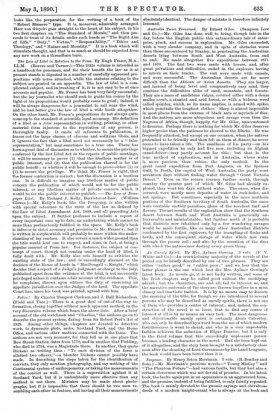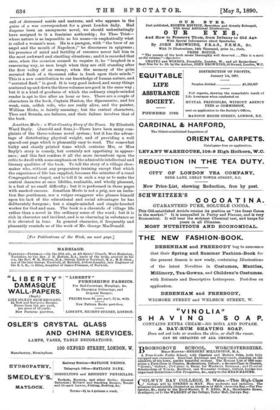Suspense. By Henry Seton Merriman. 3 vole. (R. Bentley and
Sons.) —Mr. Merriman's previous novels—" Young Mistley " and "The Phantom Future "—had various faults, but they had also a certain cleverness which was not devoid of promise. In his latest book, the faults again put in an appearance in an aggravated form, and the promise, instead of being fulfilled, is only faintly repeated. The book is mainly devoted to the gnomic sayings and chivalrous deeds of a modern knight-errant who is always at the beck and call of distressed maids and matrons, and who appears in the guise of a war correspondent for a great London daily. Had Suspense been an anonymous novel, we should unhesitatingly have assigned to it a feminine authorship ; for Theo Trist- whose nature is as impossible as his name—is emphatically what is called a woman's man. He is a paragon, with " the brow of an angel and the mouth of Napoleon ;" he discourses in epigrams ; his presence of mind and fertility of resource never fail him in the most awkward and startling situations ; and it is recorded that once, when the occasion seemed to require it, he " laughed in a reassuring way, as men laugh when they are still standing after the first volley of an enemy, when the memory of the grim serrated flash of a thousand rifles is fresh upon their minds." This is a new contribution to our knowledge of human nature, and "serrated flash " is good. It is very good indeed, and many things scattered up and down the three volumes are good in the same way ; but it is a kind of goodness of which the ordinary simple-minded reader is apt to tire after an hour or two. There are a couple of characters in the book, Captain Huston, the dipsomaniac, and his weak, vain, selfish wife, who are really alive, and the painter, William Hicks, is faintly amusing ; but the central characters, Theo and Brenda, are failures, and their failure involves that of the book.







































 Previous page
Previous page